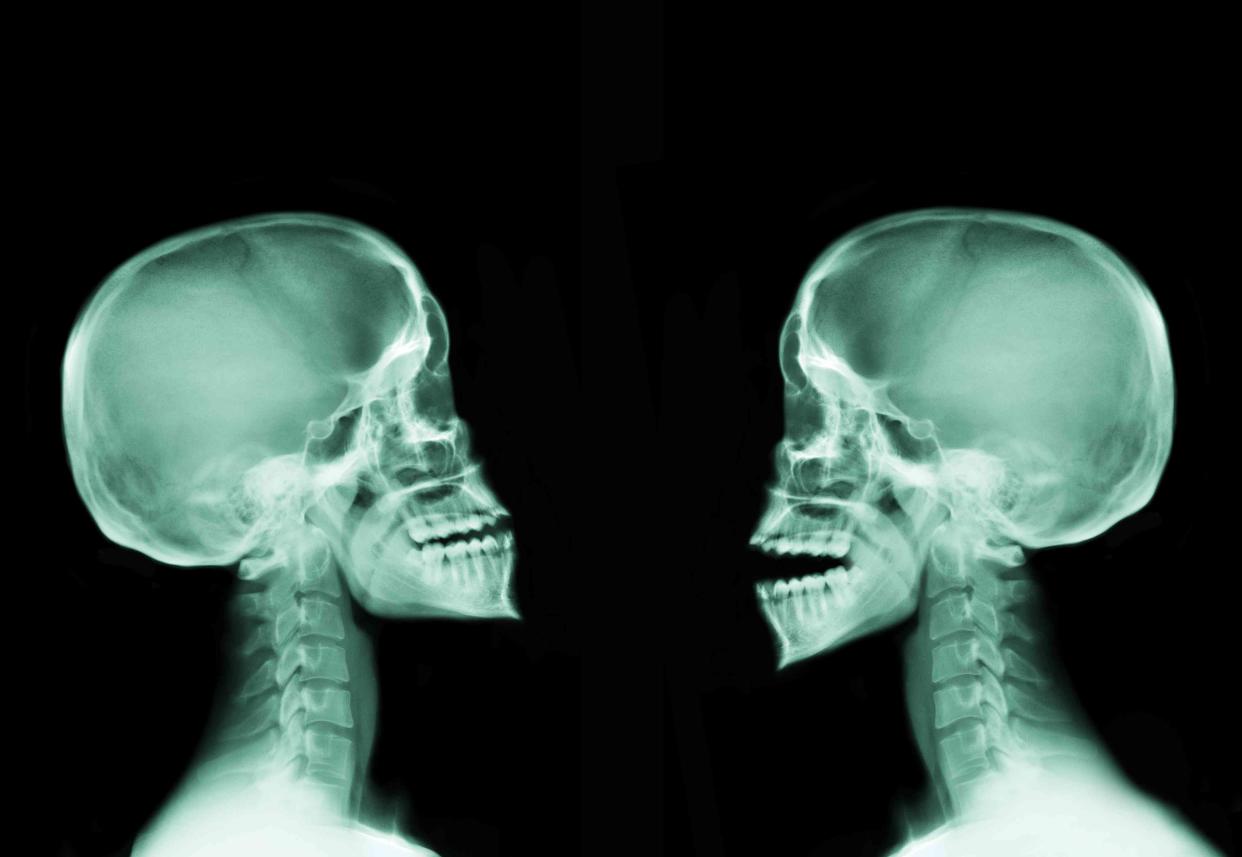Your Teeth May Hold Clues About Your Risk for This Age-Related Condition

Peter Dazeley / Getty Images
Fact checked by Nick BlackmerFact checked by Nick Blackmer
Key Takeaways
Osteoporosis can cause symptoms in the mouth, including receding gums, jaw numbness, and tooth loss.
Some problems occur when osteoporosis weakens the jaw bone, leaving the teeth implanted in it wobbly or loose.
It’s important for everyone—especially those 50 and older—to speak with a dentist about any new symptoms that arise, as these could help doctors treat osteoporosis before fractures occur, experts said.
Osteoporosis affects an estimated 10 million people 50 and older in the United States. Many people with the condition don’t know they have it until they break a bone. However, your oral health can provide clues about your osteoporosis risk, helping you identify warning signs of the condition before you break a bone.
“Osteoporosis can affect the alveolar process, which is the part of the jaw that supports teeth,” Eunjung Jo, DDS, a dentist at Astor Smile Dental in New York, told Verywell. “When the alveolar process becomes less dense, teeth can become loose or fall out.”
When osteoporosis causes oral symptoms, it’s important to consult a dental specialist and a healthcare provider who can diagnose and treat muscle and bone diseases. “If the jaw bone is involved, you’ll want to have a dentist or dental surgeon on board,” said Shailendra Singh, MD, a rheumatologist at Unity Health-White County Medical Center in Arkansas.
Together, your care team can treat the symptoms they specialize in to help preserve your quality of life and manage discomfort.
Related: Osteoporosis Facts and Statistics: What You Need to Know
Tooth Loss and Osteoporosis
Your teeth aren’t bones (though teeth are comprised, in part, of dentin—a substance harder than bone—and your teeth extend down into your jawbone)—however, osteoporosis can affect them in several ways.
Osteoporosis can weaken the jaw bone and loosen the teeth. Some people are more susceptible than others to osteoporosis complications that involve the teeth: “Women with osteoporosis are three times more likely to have loose teeth and teeth loss,” Jo said.
Osteoporosis can also affect other parts of the mouth, including the jaw and gums, Jo said. “Osteoporosis can cause the jaw to feel heavy or numb, and exposed bone may be visible,” she explained. “Osteoporosis can [also] cause gums to recede or become weaker, which can make teeth look longer or feel wobbly, [and] gums may also become painful, swollen, or infected.”
Additionally, osteoporosis can make dentures “feel loose or fit differently,” making it impossible to keep them in place.
Bisphosphonates, medications used to treat osteoporosis, can also lead to oral health problems, Jo said, explaining that they can cause a condition called osteonecrosis. “Symptoms include painful and swollen gums and jaw,” she said.
Related: Early Symptoms and Long-Term Effects of Osteoporosis
When It’s Important to Monitor Osteoporosis Symptoms
People 65 and older should have a bone density test, a screening tool for osteoporosis. Anyone 50 or older who breaks a bone should talk to their healthcare provider about osteoporosis screening sooner.
In addition to self-advocating for bone density testing, pay attention to any changes in your oral health as you age. “One of the primary reasons why visiting the dentist is crucial is the emphasis on preventive care,” Jo said. “Regular check-ups enable dentists to detect issues at their onset, preventing them from escalating into more severe problems.”
Osteoporosis is often diagnosed after a person fractures a bone, but paying attention to your oral health could help your healthcare providers diagnose the condition and, thus, provide preventative care before an injury occurs.
What This Means For You
Osteoporosis affects an estimated 10 million people 50 and older in the U.S. and can cause several oral symptoms that affect your quality of life. These include tooth loss, numbness in the jaw, and receding gums. Middle-aged and older adults should speak to a dentist when new oral symptoms arise. They can help healthcare providers diagnose any more significant health issues—such as osteoporosis—before injuries, like fractures, occur.
Read the original article on Verywell Health.
